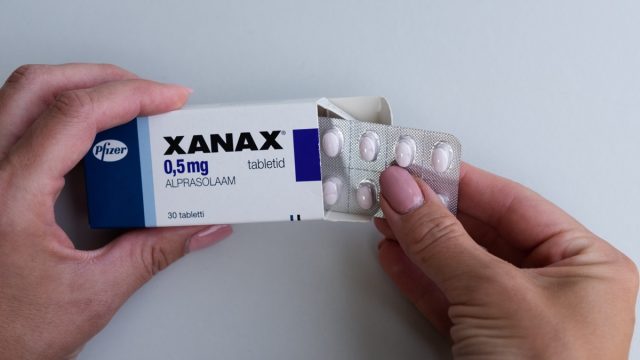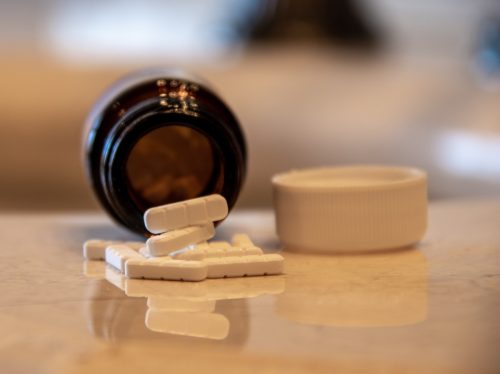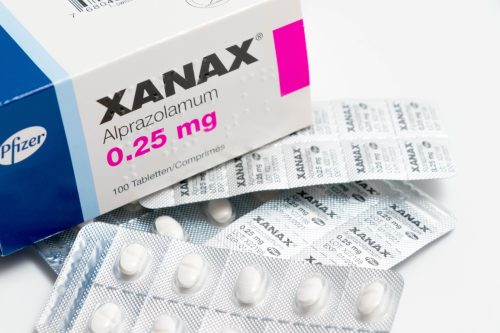New Study Reveals Harsh Truth About Taking Xanax for Anxiety

Anxiety can be debilitating, as many of us know all too well. It’s one of the most common mental health concerns in the country, with millions of people in the U.S. suffering from some type of anxiety disorder. Fortunately, there are many available treatments, from talk therapy to prescription medication. But now, new research is calling into question the effectiveness of one of the most popular prescriptions on the market, Xanax. Read on to discover more about the latest findings.
RELATED: Ozempic Patient Reveals “Excruciating” New Side Effect.
Xanax usage has been steadily rising in the U.S.

Xanax, also known by its generic name, alprazolam, is a benzodiazepine medication that is used to treat anxiety disorders and panic disorder, according to Everyday Health. It was approved by the U.S. Food and Drug Administration (FDA) in 1981, and works by lessening abnormal excitement in the brain.
Since its approval in the ’80s, the use of Xanax has skyrocketed in the U.S. As one of the most commonly prescribed psychotropic medications, it’s estimated that doctors write over 50 million prescriptions for Xanax each year, with prescription rates for this medication rising continuously by nearly 10 percent every year, per Summit Detox.
RELATED: 7 Effective Ways to Control Your Anxiety, According to Therapists.
A new study casts doubt on its effectiveness.

The widespread usage of Xanax may be distracting from how well it actually works. Researchers from Harvard University and the Oregon Health & Science University School of Medicine have collaborated on a new study, published Oct. 19 in the journal Psychological Medicine, that sought to re-examine past research on the effectiveness of alprazolam.
For this study, researchers looked at both published and unpublished data from five randomized controlled clinical trials that had been reviewed by the FDA. They specifically targeted the extended-release formulation—known as Xanax XR—because it was more recently approved by the FDA in 2003, so the agency’s review data was more easily accessible.
“Randomized controlled trials play a major role in forming the evidence base and shaping clinical practice. However, clinical decision-making is based on accessible and published studies,” the researchers stated in their study. “Trials with statistically significant results are more likely to be published than trials with non-significant results, thus inflating estimates of drug efficacy and safety.”
RELATED: New Drug Has People Losing 60 Pounds on Average, Research Shows—And It’s Not Ozempic.
The study found that Xanax may be less effective than previously indicated.

The researchers discovered that of the five trials conducted, only three had been published in medical journals. Moreover, when the FDA reviewed the drug company’s trial results on how well the drug worked for anxiety compared to a placebo, the agency determined that only one of the five trials had clearly positive results.
“We found that alprazolam XR may be less effective than the published literature would suggest,” the study concluded.
According to the researchers, publication bias may have inflated the efficacy of Xanax by more than 40 percent.
Researchers say this should reinforce caution for using this medication.

The use of Xanax has been a controversial topic over the years—largely because of concerns surrounding its addictiveness and potentially dangerous side effects. Some of the most common adverse reactions associated with alprazolam include impaired coordination, low blood pressure, difficulty speaking, decreased mental alertness, worsening depression, and memory impairment, according to American Addiction Centers.
Long-term use can also lead to dependence and “life-threatening” withdrawal symptoms, including psychosis, hallucinations, and seizures. It can increase the risk of medication misuse as well, leading to the potential for overdose and death.
“Clinicians are well aware of these safety issues, but there’s been essentially no questioning of their effectiveness,” study senior author and former FDA reviewer Erick Turner, MD, professor of psychiatry at the Oregon Health & Science University School of Medicine, told Sci Tech Daily. “Our study throws some cold water on the efficacy of this drug. It shows it may be less effective than people have assumed.”
Turner added that their research might be especially relevant to clinics and patients who are considering Xanax for treating anxiety. “This study will reinforce being cautious about starting a prescription,” he noted.
RELATED: For more up-to-date information, sign up for our daily newsletter.
Best Life offers the most up-to-date information from top experts, new research, and health agencies, but our content is not meant to be a substitute for professional guidance. When it comes to the medication you’re taking or any other health questions you have, always consult your healthcare provider directly.